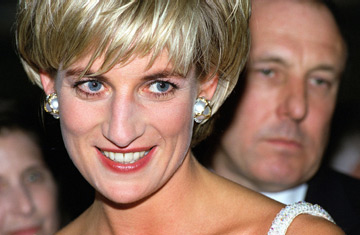
Personal correspondance between Diana, Princess of Wales and her father-in-law Prince Philip reveal a tender side to their relationship.
[editor's note: This story was first published in a limited-edition commemorative special issue of TIME in 1998.]
Once upon a time there was a little girl who learned she had been expected to be a boy. So intent were her parents on having a son that she had to wait a week after her birth to receive a name, the Honorable Diana Frances Spencer. Two older sisters and the brother who eventually arrived had royal godparents, but her father and mother picked commoners — rich ones, certainly, but untitled nevertheless — to swear their faith for her at the baptismal font.
Her first memory was of plastic, a warm synthetic smell touched off by sunlight on her stroller. She also remembered visits to the churchyard grave of the child her parents conceived just before her, a boy who lived barely 10 hours. Had he survived, she often wondered, would she have existed? Or would her mother, having produced a male heir, have left her husband for another man sooner than she actually did, breaking up the family before Diana could be born? She wished she were her oldest sister, the firstborn, the star of the family: smart, extroverted, unafraid to greet their hated stepmother with an insolent burp. At nine, Diana would bravely declare that she would marry only once — and only for love — and never, never divorce. But even as she said that, she stared out, as she would often do, from beneath her bangs, never quite looking anyone in the eye. For her parents, once in love, were no longer.
Once upon another time this little girl would grow up and fall in love and marry a prince and grow so happy for such a splendid moment that the whole world paused to marvel and rejoice with her, falling in love with Diana in love. The sunshine of her shy smile outshone royalty. she became the most famous woman on earth. But she learned quickly that though she had become a princess and borne her husband an heir, she could never truly become his queen. And when she died, suddenly, the day after the 36th anniversary of her christening, the world, still in love, stopped for a very long moment to grieve.
Why did so many mourn her so, and why do they mourn her still? Was it because the feats and foibles of British royalty have always been such an integral part of the world's story — and because Diana acted out the latest chapters in Britain's thousand-year-old soap opera with such compelling charisma, with such a facility for manipulation and melodrama? Was it just that: the flawed heroine vanishes, and we are bereft of narrative? Or was it because her unexpected end gave emotional resonance to the profuse and sometimes conflicting details of her intensely scrutinized life, uncovering omens through tragic retrospective, inchoate but nevertheless consoling proofs of destiny and meaning? Or perhaps all of that is not quite the heart of the grieving. Perhaps the mourning was over something simple yet profound, something cosmic yet common...
What cannot be denied is that in the beginning there was majesty, that fascinating natural resource of her homeland, a country celebrated by its greatest bard as "this England ... this teeming womb of royal kings, fear'd by their breed and famous by their birth." Still, majesty is a concept that requires re-enchantment every generation or so — and in this time the spell was Diana.
Her mother-in-law, the Queen, had once worked the magic. Elizabeth had continued the task thrust upon her father, purging the dynasty of the scandal that had threatened to ruin it, brought on by her irresponsible playboy of an uncle, who shirked duty and gave up the throne for a forbidden marriage. Elizabeth furthered the reconstruction of the Windsors by making the clan work, making it the inspiring exemplar of ideal family life, albeit one adorned with crowns and tiaras. Elizabeth would serve. She would persevere. She would be dutiful. She would obey.